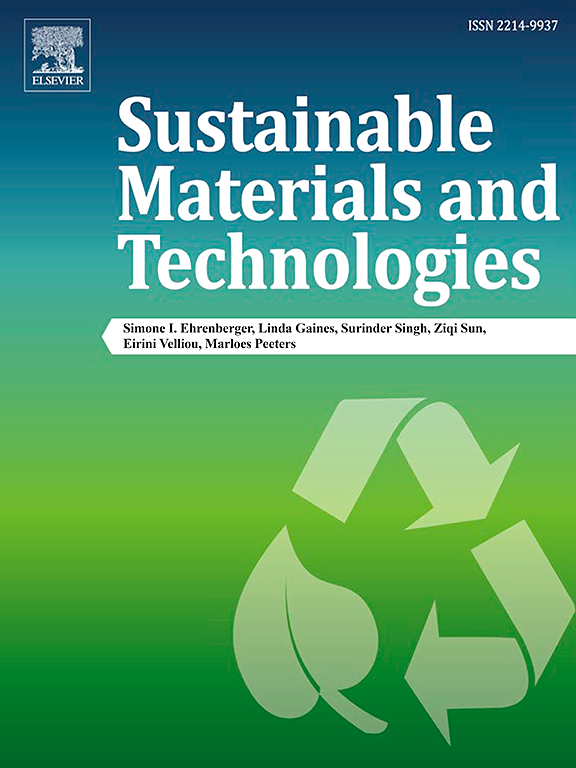未分类的消费后聚乙烯和聚对苯二甲酸乙二醇酯通过机械化学增容回收食品包装
IF 9.2
2区 工程技术
Q1 ENERGY & FUELS
引用次数: 0
摘要
来自包装材料的塑料废物的不断积累构成了严重的环境威胁,强调需要先进的回收技术来有效地重新利用消费后(PC)聚合物。传统的机械回收塑料废物处理方法包括分类、切割、清洗和熔体再处理。然而,包装材料通常由多个紧密粘附的聚合物层组成,很难完全分离。因此,未完全分类的PC聚合物混合物进行熔体再加工,通常产生的回收产品具有较差的材料性能,不适合重复使用。为了解决这一限制,一种先进的回收方法在熔体再加工过程中实现混合聚合物的原位增容是必不可少的。在这项研究中,我们应用机械化学(MC)和等离子辅助机械化学(PMC)对低密度聚乙烯(LDPE)和聚对苯二甲酸乙二醇酯(PET)的未分类共混物进行再处理。通过在干燥环境中施加高能机械力(pmc的情况下是等离子体气体),这些机械化学处理在LDPE和PET之间产生共价键,形成两亲共聚物,起到相容剂的作用。这种增强的界面相容性导致熔体-再加工混合物的机械,屏障和光学性能得到改善,使其适合作为食品包装材料重复使用。通过MC和PMC促进原位相容,我们的研究在未分类的多组分PC塑料共混物的机械回收方面取得了突破,有可能减少对原生聚合物的依赖,减轻塑料废物对环境的影响。本文章由计算机程序翻译,如有差异,请以英文原文为准。
Recycling of unsorted post-consumer polyethylene and polyethylene terephthalate via mechanochemical compatibilization for food packaging
The rising accumulation of plastic waste from packaging materials poses a severe environmental threat, emphasizing the need for advanced recycling technologies to repurpose post-consumer (PC) polymers effectively. Conventional mechanical recycling methods for plastic waste treatment involve sorting, chopping, cleaning, and melt-reprocessing. However, packaging materials often consist of multiple tightly adhered polymer layers that are difficult to separate completely. As a result, incompletely sorted mixtures of PC polymers undergo melt-reprocessing, typically producing recycled products with inferior material properties unsuitable for reuse. To address this limitation, an advanced recycling approach enabling in situ compatibilization of mixed polymers during melt-reprocessing is essential. In this study, we applied mechanochemistry (MC) and plasma-assisted mechanochemistry (PMC) to reprocess unsorted blends of low-density polyethylene (LDPE) and polyethylene terephthalate (PET). By applying high-energy mechanical forces—and plasma gas in the case of PMC—in a dry environment, these mechanochemical treatments generated covalent linkages between LDPE and PET, forming amphiphilic copolymers that acted as compatibilizers. This enhanced interfacial compatibility resulted in improved mechanical, barrier, and optical properties in the melt-reprocessed blend, making it suitable for reuse as food packaging material. By promoting in situ compatibilization through MC and PMC, our study offers a breakthrough in the mechanical recycling of unsorted, multicomponent PC plastic blends, potentially reducing dependence on virgin polymers and mitigating the environmental impact of plastic waste.
求助全文
通过发布文献求助,成功后即可免费获取论文全文。
去求助
来源期刊

Sustainable Materials and Technologies
Energy-Renewable Energy, Sustainability and the Environment
CiteScore
13.40
自引率
4.20%
发文量
158
审稿时长
45 days
期刊介绍:
Sustainable Materials and Technologies (SM&T), an international, cross-disciplinary, fully open access journal published by Elsevier, focuses on original full-length research articles and reviews. It covers applied or fundamental science of nano-, micro-, meso-, and macro-scale aspects of materials and technologies for sustainable development. SM&T gives special attention to contributions that bridge the knowledge gap between materials and system designs.
 求助内容:
求助内容: 应助结果提醒方式:
应助结果提醒方式:


